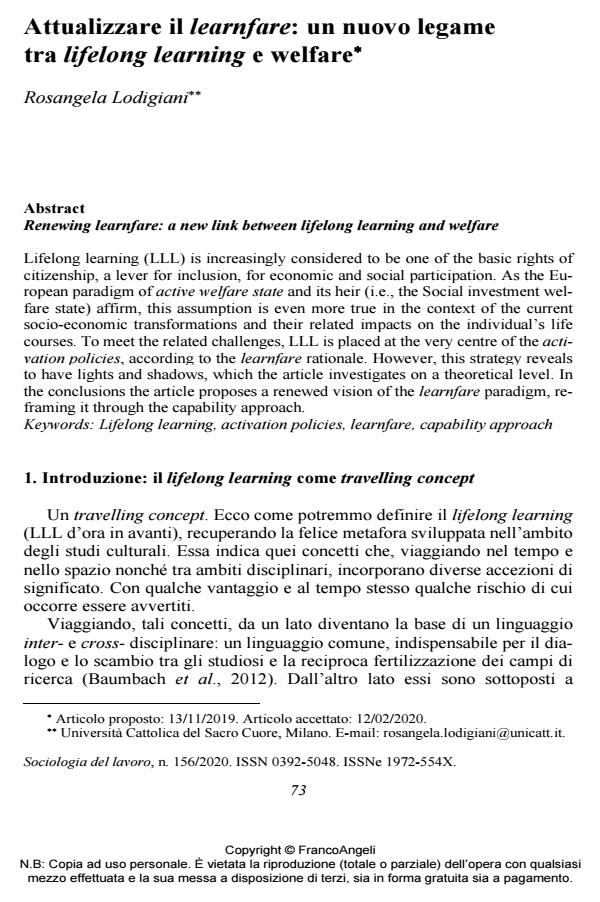Attualizzare il learnfare: un nuovo legame tra lifelong learning e welfare
Titolo Rivista SOCIOLOGIA DEL LAVORO
Autori/Curatori Rosangela Lodigiani
Anno di pubblicazione 2020 Fascicolo 2020/156
Lingua Italiano Numero pagine 23 P. 73-95 Dimensione file 235 KB
DOI 10.3280/SL2020-156004
Il DOI è il codice a barre della proprietà intellettuale: per saperne di più
clicca qui
Qui sotto puoi vedere in anteprima la prima pagina di questo articolo.
Se questo articolo ti interessa, lo puoi acquistare (e scaricare in formato pdf) seguendo le facili indicazioni per acquistare il download credit. Acquista Download Credits per scaricare questo Articolo in formato PDF

FrancoAngeli è membro della Publishers International Linking Association, Inc (PILA), associazione indipendente e non profit per facilitare (attraverso i servizi tecnologici implementati da CrossRef.org) l’accesso degli studiosi ai contenuti digitali nelle pubblicazioni professionali e scientifiche.
Il LLL è sempre più considerato come parte integrante dei diritti di cittadinanza, leva di inclusione e partecipazione economica e sociale. Ciò – come sostengono il paradigma europeo dell’Active Welfare State e il suo diretto erede: il Social Investment Welfare State – è tanto più vero nel contesto delle attuali trasformazioni socio-economiche e dei loro impatti sulle carriere di vita dei soggetti. Per fronteggiare le sfide che ne discendono, il LLL è posto al centro delle "politiche di attivazione", in una logica di learnfare. Ma questa strategia ha luci ed ombre, che l’articolo indaga sul piano teorico, per giungere nelle conclusioni a tratteggiare una rinnovata visione del learnfare, proponendone la rilettura attraverso le categorie del capability approach.
Parole chiave:Lifelong learning, politiche di attivazione, learnfare, capability approach
- “The contribution of MOOCs to upskilling the labor force” Valentina Goglio, Sonia Bertolini, in Journal of Workplace Learning /2021 pp.561
DOI: 10.1108/JWL-10-2020-0159
Rosangela Lodigiani, Attualizzare il learnfare: un nuovo legame tra lifelong learning e welfare in "SOCIOLOGIA DEL LAVORO " 156/2020, pp 73-95, DOI: 10.3280/SL2020-156004